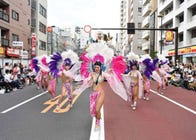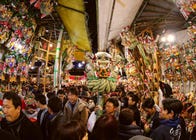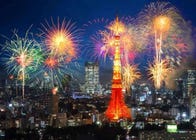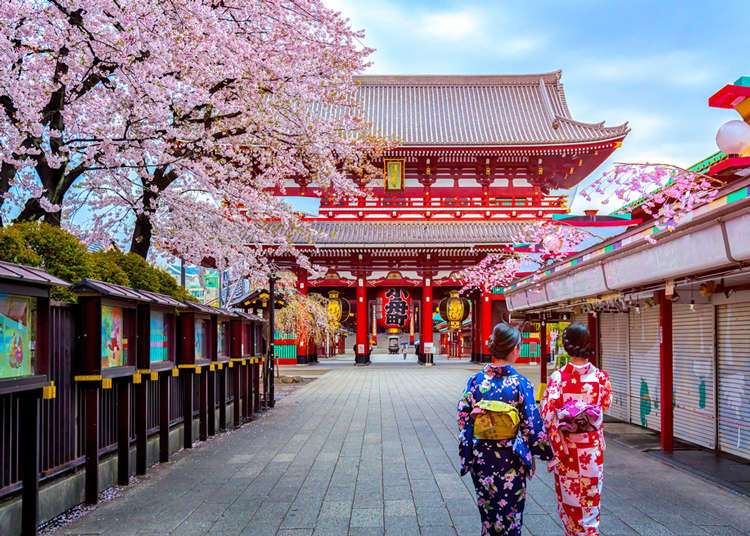
Top Events & Festivals in Asakusa (Tokyo): Discover Year-Round Traditions and Fun
- Written by: LIVE JAPAN Editor
Asakusa, Tokyo's vibrant "old town," is more than its iconic Kaminarimon Gate, Sensoji Temple, and bustling streets. It's also a lively hub for traditional festivals and seasonal events. From the energetic Sanja Matsuri to the dazzling Sumida River Fireworks, Asakusa offers unforgettable experiences throughout the year.
In this guide, we've handpicked the best annual events in Asakusa to help you plan your visit. Check out the festival highlights and see if they align with your trip for a truly memorable experience.
January Festivals in Asakusa
Hatsumode (First Shinto shrine or Buddhist temple visit of the Japanese New Year)
・When: January 1
・Where: Sensoji Temple
Hatsumōde, the first visit to a temple or shrine in the New Year, is a cherished Japanese tradition. At Sensō-ji Temple, this event draws massive crowds, with lines stretching all the way to Nakamise Street starting at midnight on December 31. It’s one of the most popular spots for hatsumōde in Tokyo.
Shichifukujin-mōde (Visiting the 7 Lucky Gods)
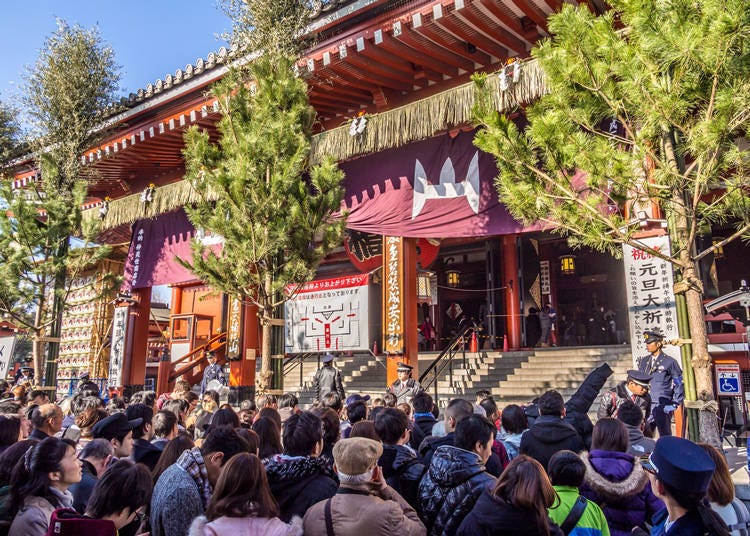
・When: January 1 ~ early January
・Where: Sensoji Temple, Asakusa Shrine, Tainyusanshoten, Imado Shrine, Hashiba Fudoson, Ishihama Shrine, Otori Shrine, Yoshiwara Shrine, Yasaki Inari Shrine
From New Year's Day through early January, many people participate in Shichifukujin-mōde, a pilgrimage to visit shrines and temples dedicated to the Seven Lucky Gods. In Asakusa, this tradition is celebrated along the "Asakusa Shichifukujin" course, where visitors can pay their respects to these deities at various well-known sites.
-

-
Address
2-3-1, Asakusa, Taitou-ku, Tokyo, 111-0032
View Map -
Nearest Station
Asakusa Station (Tokyo Metro Ginza Line / Toei Asakusa Line / Tobu Isesaki Line (Tobu Skytree Line) / Tsukuba Express)
5 minutes on foot
- Phone Number 03-3842-0181
-
Address
2-3-1, Asakusa, Taitou-ku, Tokyo, 111-0032
February Festivals in Asakusa
Setsubun (Day before the beginning of spring)
・When: February 3
・Where: Sensoji Temple
Setsubun is a traditional Japanese event where people throw roasted soybeans while chanting "Fortune in, demons out" to ward off evil spirits and bring good luck. At Sensō-ji Temple, a large-scale mamemaki (bean-throwing ceremony) takes place on February 3. In recent years, the event has featured well-known celebrities, known as toshio-toko (men of the zodiac year), participating in the bean-throwing festivities.
Setsubunkai and Fukuju Dance (Seven Lucky Gods Dance)
・When: February 3
・Where: Sensoji Temple
After the mamemaki (bean-throwing ceremony) during Setsubun, the Fukuju no Mai (Dance of the Seven Lucky Gods) is performed. This dance honors the blessings of Kannon, the Goddess of Mercy, and is said to originate from the legends of the Seven Lucky Gods. Watching the Seven Lucky Gods perform this vibrant and symbolic dance together is a sight not to be missed.
March Festivals in Asakusa
Tokyo Marathon Support Event
・When: March
・Where: In front of Kaminari Gate
The Tokyo Marathon, a world-renowned annual marathon held in Tokyo, passes through Asakusa, including the iconic Kaminarimon Gate. To celebrate the event, special cheering events take place in front of Kaminarimon each year. Highlights include the Kinryu no Mai (Golden Dragon Dance), one of Sensō-ji Temple's traditional performances, and captivating shows by Asakusa geisha, adding vibrant energy to the Tokyo Marathon.
Asakusa Kannon Shigenkai Kinryu no Mai
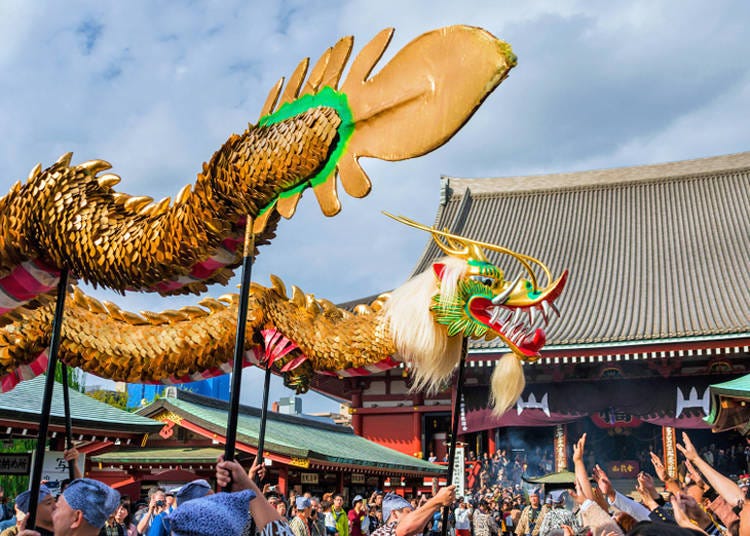
・When: March 18
・Where: Sensoji Temple
At Sensō-ji Temple, the Jigen-e ceremony is held annually on March 18 to commemorate the day in 628, during the reign of Empress Suiko, when the temple’s principal deity, Kannon (Goddess of Mercy), is said to have appeared in the Miyato River (now the Sumida River). To honor this occasion, the Kinryu no Mai (Golden Dragon Dance) is performed, inspired by the temple's origin story and its mountain name, Kinryūzan (Golden Dragon Mountain). The impressive 15-meter-long, 80-kilogram golden dragon captivates visitors with its elegant and powerful movements.
Immerse yourself in the solemnity and grandeur of the Shigenkai event as the temple grounds come alive with a mesmerizing performance known as the Kinryu no Mai, named after the majestic Mt. Kinryu. The centerpiece of this extraordinary spectacle is the vibrant and awe-inspiring Golden Dragon, measuring an impressive 15 meters in length and weighing a hefty 80 kilograms. As the captivating dance unfolds, it is believed to bestow blessings and good fortune upon Sensoji Temple, creating an atmosphere of auspiciousness and reverence.
Sumida Park Cherry Blossom Festival
・When: Mid-March to early April (depending on when the cherries are in bloom)
・Where: Sumida Park
The Sumida Park Cherry Blossom Festival takes place annually along the Sumida River, between Azuma Bridge and Sakura Bridge—one of Japan’s most renowned cherry blossom viewing spots. With approximately 510 cherry trees in full bloom, the park offers a breathtaking spectacle. Visitors can enjoy stunning views of cherry blossoms with the Tokyo Skytree as a backdrop or take a yakatabune (traditional riverboat) to admire the beautiful rows of blossoms lining both banks. In the evening, the cherry blossoms are illuminated, creating a magical atmosphere that contrasts with the daytime scenery.
-

-
Address
Sumida-ku, Tokyo, 131-0033
View Map -
Nearest Station
Asakusa Station (Tokyo Metro Ginza Line / Toei Asakusa Line / Tobu Isesaki Line (Tobu Skytree Line) / Tsukuba Express)
5 minutes on foot
-
Address
Sumida-ku, Tokyo, 131-0033
April Festivals in Asakusa
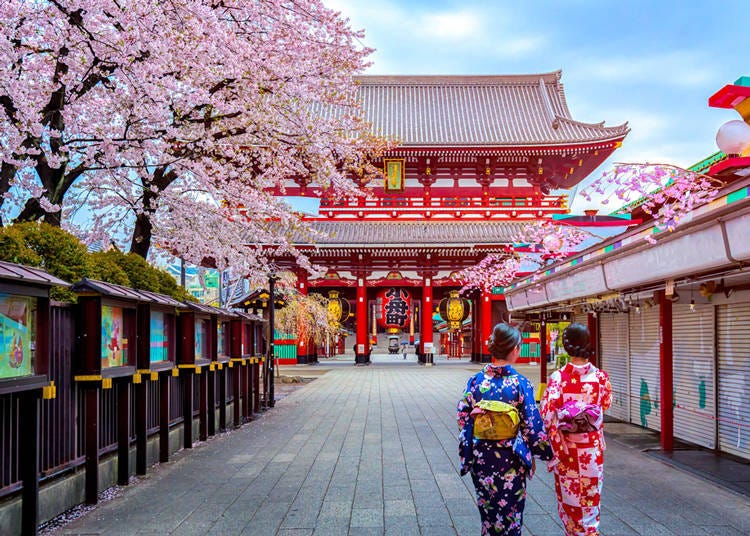
Asakusa Kannon-ura and Ichiyozakura Festival
・When: Second Saturday in April
・Where: Ichiyozakura and Komatsubashi Street (Asakusa 5-chome), Yanagi Street (Asakusa 4-chome)
The Asakusa Kannon-ura Ichiyo Sakura Festival takes place along Ichiyo Sakura Komatsubashi Street, located on the north side of Sensō-ji Temple. This picturesque avenue, lined with around 320 blooming Ichiyo cherry trees, becomes the stage for lively events, including a parade by local elementary school students, street performances, food stalls run by neighborhood women’s groups, and a bustling flea market. A highlight of the festival is the Edo Yoshiwara Oiran Dōchū, where elegantly dressed oiran (courtesans) parade gracefully through the cherry blossom-lined street, starting from Senzoku 3-chome—a spectacle not to be missed.
May Festivals in Asakusa
Asakusabashi Red and White Maronie Festival
・Event date: Mid-May
・Venue: Near the Hulic Asakusabashi Building
The Asakusabashi Red and White Horse Chestnut Festival is held annually in May around the Asakusabashi area, where the beautiful horse chestnut flowers bloom. The event features lively parades, food stalls, traditional rakugo (comic storytelling), and vibrant stage performances, offering a variety of activities that draw crowds every year.
Sanja Matsuri
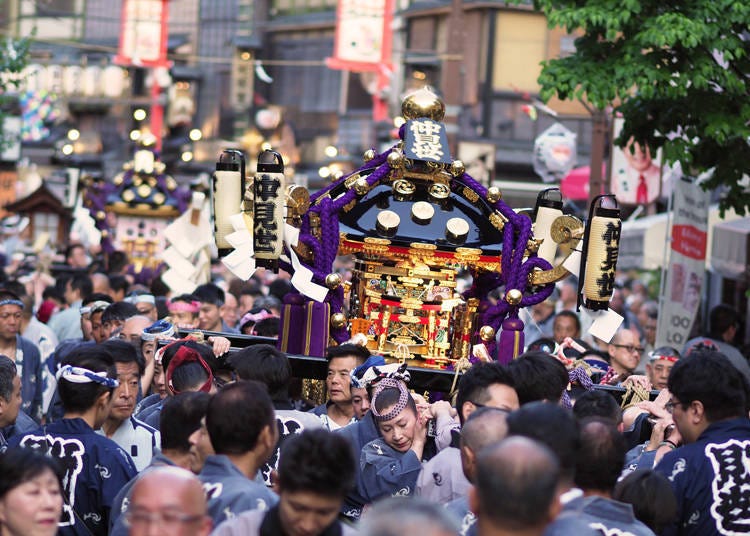
・When: 3rd Friday, Saturday, and Sunday in May
・Venue: Asakusa Shrine
The Sanja Matsuri, one of the "Three Great Festivals of Edo" and among Japan’s most famous festivals, brings unparalleled energy to Asakusa, marking the arrival of early summer. Highlights include the grand procession featuring traditional performances such as ohayashi (festival music), tobigashira chants, the Binzasara Mai dance, and the elegant Shirasagi no Mai (White Heron Dance). The spectacle of approximately 100 portable shrines (mikoshi) parading through the streets during the ren’go togyo (united procession) is a must-see. Throughout the festival, food and game stalls pop up across the area, transforming all of Asakusa into a vibrant celebration.
June Festivals in Asakusa
O-Fuji-san Ueki Ichi
・When: Last Saturday and Sunday in May and June
・Venue: Near Sengen Shrine
The O-Fuji-san Ueki Ichi is a large-scale plant market held along Yanagi Street, which becomes a pedestrian zone during the event. Timed perfectly with the nyūbai (early summer rainy season), this market offers an ideal opportunity for transplanting plants and trees. It is said that trees purchased at this event bloom especially well, adding to its popularity among gardening enthusiasts.
-
Asakusa Fuji Sengen-jinja Shrine浅草富士浅間神社
- Address 5 Chome-3-2 Asakusa, Taito City, Tokyo 111-0032
July Festivals in Asakusa
Sumida River Fireworks Festival
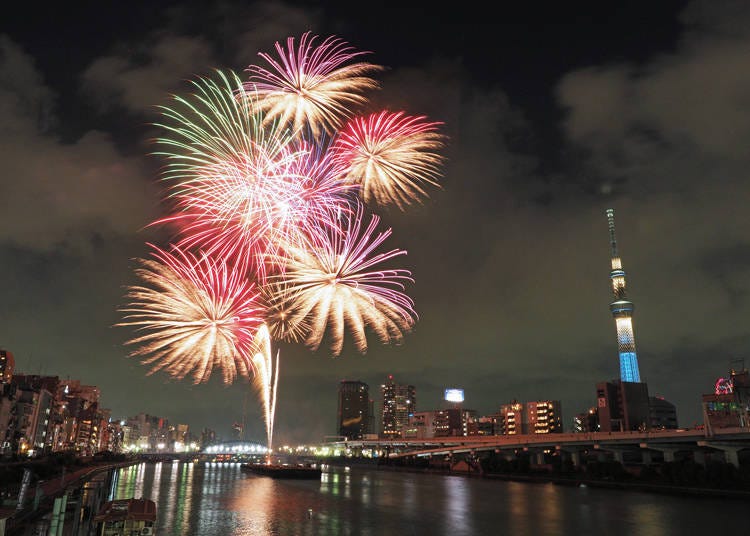
・When: The event takes place on the last Saturday in July.
・Where: The event is held at Sumida River.
The Ryogoku Fireworks Festival, which began in 1733 during the Kyōhō era, is one of Tokyo’s most famous and historic fireworks displays, attracting around one million spectators annually. The event features two main viewing areas, where a total of approximately 20,000 fireworks light up the night sky. At the first venue, a fireworks competition showcases stunning displays created by renowned pyrotechnic companies, including those with award-winning performances from major festivals across Japan. Spectators are treated to a dazzling variety of creative and powerful fireworks each year, making this an unforgettable summer highlight.
-

-
Address
Sakurabashi Lower Sumida-ku-Kotobashi Upper (1st venue), Komagata-bashi Lower-Kamabashi (2nd venue), 130-0000
View Map -
Nearest Station
Asakusa Station (Tokyo Metro Ginza Line / Toei Asakusa Line / Tobu Isesaki Line (Tobu Skytree Line) / Tsukuba Express)
15 minutes on foot
- Phone Number 03-5246-1111
-
Address
Sakurabashi Lower Sumida-ku-Kotobashi Upper (1st venue), Komagata-bashi Lower-Kamabashi (2nd venue), 130-0000
Shitamachi Tanabata Matsuri (Downtown Festival of the Weaver)
・When: Early July.
・Where: Kappabashi Main Street, located near 2-3 chome, Nishi Asakusa and 2-3 chome, Matsugaya, Taito Ward.
The Shitamachi Tanabata Matsuri is an annual festival held along Kappabashi Hondori Street, which connects Asakusa and Ueno. The street comes alive with vibrant performances such as Awa Odori dances, Etchu Owara Bushi folk songs, and traditional wadaiko (Japanese drumming). Visitors can also enjoy colorful Tanabata decorations and food stalls operated by local shops, creating a lively and festive atmosphere.
-

-
Address
1, Matsugaya, Taitou-ku, Tokyo, 111-0036
View Map -
Nearest Station
Tawaramachi Station (Tokyo Metro Ginza Line)
- Phone Number 03-3844-1225
-
Address
1, Matsugaya, Taitou-ku, Tokyo, 111-0036
September Festivals in Asakusa
Asakusa Samba Carnival Parade Contest
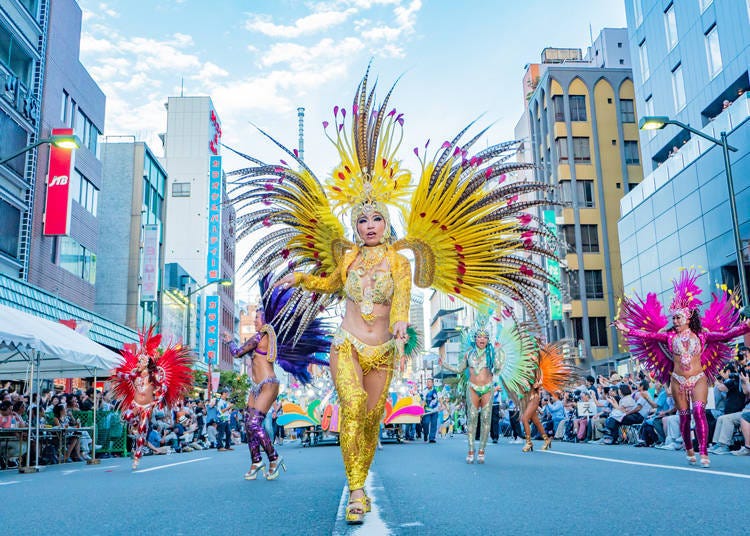
・When: Late August or early September
・Where: Asakusa (from Umamichi-dori to Kaminarimon-dori)
The Asakusa Samba Carnival Parade Contest is a major summer finale event in Asakusa, bringing the vibrant energy of Rio de Janeiro’s carnival to Tokyo. Dancers dressed in dazzling, colorful costumes parade through the streets, moving to the infectious rhythm of samba music. The parade contest, featuring spirited and competitive performances, is a highlight that captivates visitors with its energy and flair.
November Festivals in Asakusa
Shirasagi no Mai
・When: Second Sunday in April and on November 3
・Where: In the vicinity of Sensoji Temple
The Shirasagi no Mai (White Heron Dance) was created in 1968 to commemorate Tokyo's 100th anniversary, inspired by the Sagi Mai depicted in the Asakusa Temple Keian Engi Emaki, a ceremonial scroll from 1652. Performers dressed as elegant white herons, warriors, pole-bearers, large umbrella holders, and musicians parade through the temple grounds while playing the Shirasagi no Shō (White Heron Chant). This graceful and historical performance is a beautiful spectacle that brings Asakusa's traditions to life.
Tori no Ichi (Hagoita Fair)
・When: The fair is held on select days in November. Please refer to the article link for this year's specific dates.
・Where: In the vicinity of Sensoji Temple.
The Tori no Ichi (Hagoita Market/Rooster Market) is a beloved year-end tradition in Asakusa, marking the final market of the year. Originally a place to purchase everyday items and New Year's goods, it became known as the Hagoita Market due to the increasing popularity of decorative hagoita (battledore paddles). These paddles, adorned with a variety of designs, range from classic Kabuki motifs to satirical depictions of current events and portraits of popular celebrities, offering a colorful and unique glimpse into the year’s trends.
December Festivals in Asakusa
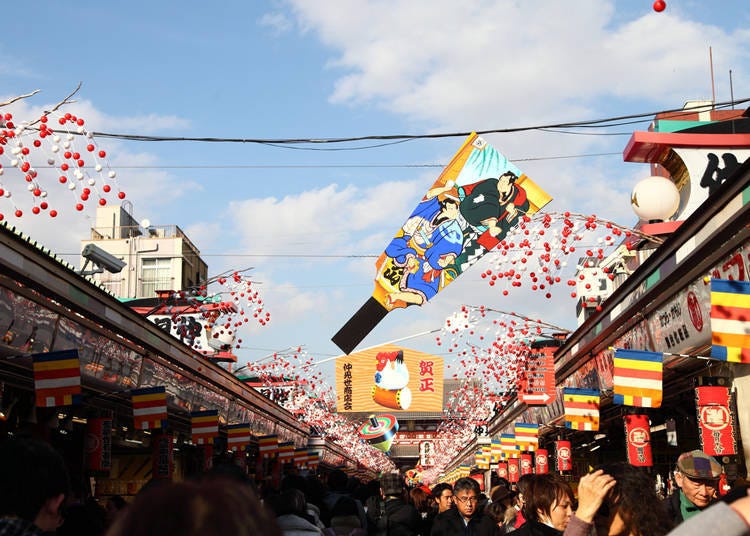
Joya no Kane
・When: December 31
・Where: Sensoji Temple
The Joya no Kane (New Year's Eve Bell Ringing) is a traditional Japanese Buddhist ceremony held at temples on the night of December 31. Monks ring the temple bell 108 times to symbolize the cleansing of the 108 earthly desires, helping people welcome the New Year with a purified spirit. At Sensō-ji Temple, many visitors gather from the evening of New Year's Eve, reflecting on the past year while awaiting the arrival of the new year in a solemn and serene atmosphere.
We’ve highlighted some of the annual events and festivals that bring Asakusa to life. While Asakusa is always worth visiting, experiencing it during these lively celebrations adds an extra layer of excitement and charm. If you’re planning a trip, why not use these events to help shape your schedule and make the most of your visit?
The LIVE JAPAN editorial team is a multinational group made up of native editors who have lived in Japan for over five years and Japanese editors who love to travel. Together, we share the best of Japan, offering cultural insights, historical context, event updates, and travel-friendly deals, to support your journey every step of the way.
- Area
- Category
*Prices and options mentioned are subject to change.
*Unless stated otherwise, all prices include tax.
Popular Tours & Activitiess
-
Ad

The Latest Guide to "Tourism Mobility": Traveling Japan More Freely. What exactly are Japan’s version of ride-sharing and transit deserts?
-

Top 3 OSHI MAPs for the Best Matcha and Sweets in Tokyo
by: Guest Contributor
-
Ad

5 Recommended Wagyu Yakiniku Restaurants in Tokyo: Signature Dishes, Premium Beef, and Secret Sauces
-

Farewell, Heavy Suitcases! Keisei Ueno’s New Service Makes Your Last Day in Tokyo Totally Hands-Free
by: Guest Contributor
-

To the Holy Land of Kawaii! Odakyu Tama Center Station Is Becoming a Dreamy Sanrio Wonderland
by: Guest Contributor
-
Ad

The Whisper of a 1,300-Year-Old History: Meet the Other Face of Nara at Night
by: Shingo Teraoka
-

4 Best Tokyo Festivals in March: Fun Ways to Greet Spring
-

Asakusa Samba Carnival (August 30): Access, Tips, Best Photo Spots & More
by: Jiei Kurabayashi
-

Sanja Matsuri: Inside Guide to One of Tokyo’s Most Famous Festivals
-

Easy Day Trip from Tokyo! Ultimate Sightseeing Guide for Hakone & Lake Ashinoko!
-

JR Edition: Visit all of Tokyo in one Day with the Tokyo Metropolitan District Pass!
-

Tokyo Roppongi: 5 Most Amazing Spots at Roppongi Hills and How to Make the Best of Them!
- #best ramen tokyo
- #what to buy in ameyoko
- #what to bring to japan
- #new years in tokyo
- #best izakaya shinjuku
- #things to do tokyo
- #japanese nail trends
- #what to do in odaiba
- #onsen tattoo friendly tokyo
- #daiso
- #best sushi ginza
- #japanese convenience store snacks
- #best yakiniku shibuya
- #japanese fashion culture
- #best japanese soft drinks


















